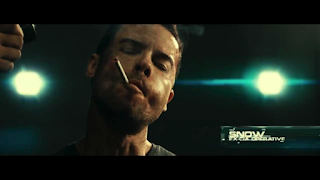This semester in TCF 312 is truly one I will never forget. I
learned so many invaluable lessons that could only be taught through the medium
of film. One of the biggest lessons I learned is that you haven’t done anything
until you’ve picked up a camera and tried to go shoot something yourself. Once
you put yourself behind the lens, everything changes. Complications may arise
that you didn’t anticipate before, however you have a crew to help overcome
them. My skills as an artist increased dramatically throughout the semester as
I progressed from project to project. I shot more scenes and places then I ever
have in my life, which was a great experience. The best way to learn something
isn’t to read a book or watch a help video; the best way to learn something is
to do it yourself. This is exactly what shooting my first scene assignment did
for me. I had never directed anything before in my life and was excited for the
challenge. As I developed my script, storyboards, and shooting plans, I
realized how much more of a challenge it was going to be. The logistics that
are involved in directing a set are somewhat overwhelming at first, but doable.
Before shooting the scene, it is impossible to foresee what problems you may
have from your particular set. Whether it’s the lighting, the set, or the
actors, there is always some variable that is going to make your job as a
director that much harder. This is where the real learning begins. Through the
readings and other homework assignments, I learned that being a successful
filmmaker is dependent on your ability to adapt quickly. I had no idea that
fast decision making was going to be such an important part of my job, but it
helped me learn that much faster. My skills, of course, still need dramatic
improvement in order to get to where I want to be as a director, filmmaker, or
editor. I realized my visual storytelling skills weren’t my best asset but also
learned how important they are. Not only is the individual skill of visual
storytelling important, it’s also its relationship with the rest of the
components of film that matter. A good
director has the ability to make these components come together into one
complex narrative. Looking forward, im very excited to start my career in the
film industry. Hopefully, it will start this summer with an internship and
develop from there. I have no specific or set goals of what I want to do for
the rest of my life so my options are open. I do know, however, that film will
always be a part of it and that I will love continuing to work on projects that
are others or my own.
Friday, December 11, 2015
Tuesday, December 8, 2015
Artist Statement
As a young filmmaker, I still feel like I’m figuring out
what exactly my unique artistic style is. I discover new things that inspire me
everyday; therefore I never want to limit potential influences by staying
within my comfort zone. I learned in this class that it is as important to try
new things as it is to not judge things you might not agree with or understand.
Everyone has different styles, which is what makes filmmaking a completely distinct
experience for everyone. I love gritty
television series such as True Detective, Boardwalk Empire, and Peaky Blinders
because they all glorify a key protagonist to a god-like level. I like this
style of television because of the constant struggle that the god-like
character faces to stay on top of his world within the story. Constant undermining,
attempted assassinations, and betrayal are major themes in these series that
particularly peak my interest as a viewer. At the other end of the spectrum, I
enjoy crude, raunchy comedies like It’s Always Sunny in Philadelphia, Curb Your
Enthusiasm, and Trailer Park Boys. All of these shows have characters with very
defiant and quirky personalities that always seem to get themselves in a sticky
situation. I love watching how these situations develop throughout the episode
and how the different characters handle the situations individually. What I find entertaining is how these
characters constantly dig themselves into holes and then hilariously try to get
out of them, causing some sort of fiasco along the way. As far as movies, I
like to stick to cinematic thrillers with lots of striking visuals and intense
moments such as Interstellar, Pulp Fiction, and Silence of the Lambs. I learned
in this class how important it is to use every single one of your tools as a
director to captivate the audience and make them think what you want them to
think. From lighting to sound to blocking, each plays a specific and
influential role in enchanting the audience and keeping their attention. I realized
it’s the relationship between all these components that truly matters. Without
one, the others are useless. This class taught me how to properly piece
together these elements to evoke emotion and responsiveness from the viewer.
Monday, December 7, 2015
Subscribe to:
Comments (Atom)















